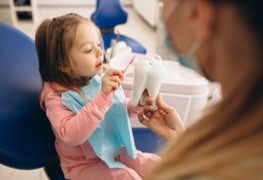
Pediatric/Kids Dentistry
 Our team of child specialist dentists not only cater to the needs of a child for dental treatment but also guide and teach them the best oral hygiene methods thus creating oral hygiene awareness for future.
Our team of child specialist dentists not only cater to the needs of a child for dental treatment but also guide and teach them the best oral hygiene methods thus creating oral hygiene awareness for future.
Key Aspects of Pediatric Dentistry:
Preventive Care:
Dental Examinations: Regular dental check-ups are essential to monitor the growth and development of a child’s teeth and address any concerns early. Professional Cleanings: Dental cleanings help prevent cavities and gum disease by removing plaque and tartar.
Education and Counseling:
Oral Hygiene Instruction: Pediatric dentists educate children and their parents about proper oral hygiene practices, including brushing, flossing, and a balanced diet.
Preventive Measures: Dentists may recommend fluoride treatments and dental sealants to protect teeth from decay.
Early Detection and Treatment:
Identification of Dental Issues: Pediatric dentists are trained to identify and address common dental issues in children, such as cavities, misalignment, and bite problems.
Orthodontic Assessment: Monitoring the development of the child’s bite and jaw, and making referrals to orthodontists if necessary.
Behavior Management:
Child-Friendly Environment: Pediatric dental offices are designed to be child-friendly, with colorful decor, toys, and entertainment to create a positive and comfortable atmosphere.
Behavioral Techniques: Pediatric dentists use age-appropriate communication and behavior management techniques to build trust and alleviate anxiety in young patients.
Specialized Services:
Dental Sealants: Protective coatings applied to the chewing surfaces of molars to prevent cavities.
Fluoride Treatments: Application of fluoride to strengthen tooth enamel and prevent decay.
Space Maintainers: Devices used to hold space for permanent teeth if baby teeth are lost prematurely.
Emergency Dental Care:
Pediatric dentists are equipped to handle dental emergencies, such as injuries to the teeth or mouth.
Transition to Adult Dentistry:
Pediatric dentists often work with adolescents to transition them to adult dental care, providing guidance on maintaining oral health as they grow.
Tips for Parents:
Early Dental Visits: The American Academy of Pediatric Dentistry recommends that a child’s first dental visit should occur by their first birthday or when the first tooth erupts.
Supervise Oral Hygiene: Parents should assist with brushing until a child can effectively brush on their own, usually around the age of 6. Limit Sugary Snacks: Encourage a healthy diet with limited sugary snacks and drinks to prevent tooth decay.Positive Reinforcement: Praise and positive reinforcement can help create a positive attitude toward dental care.

